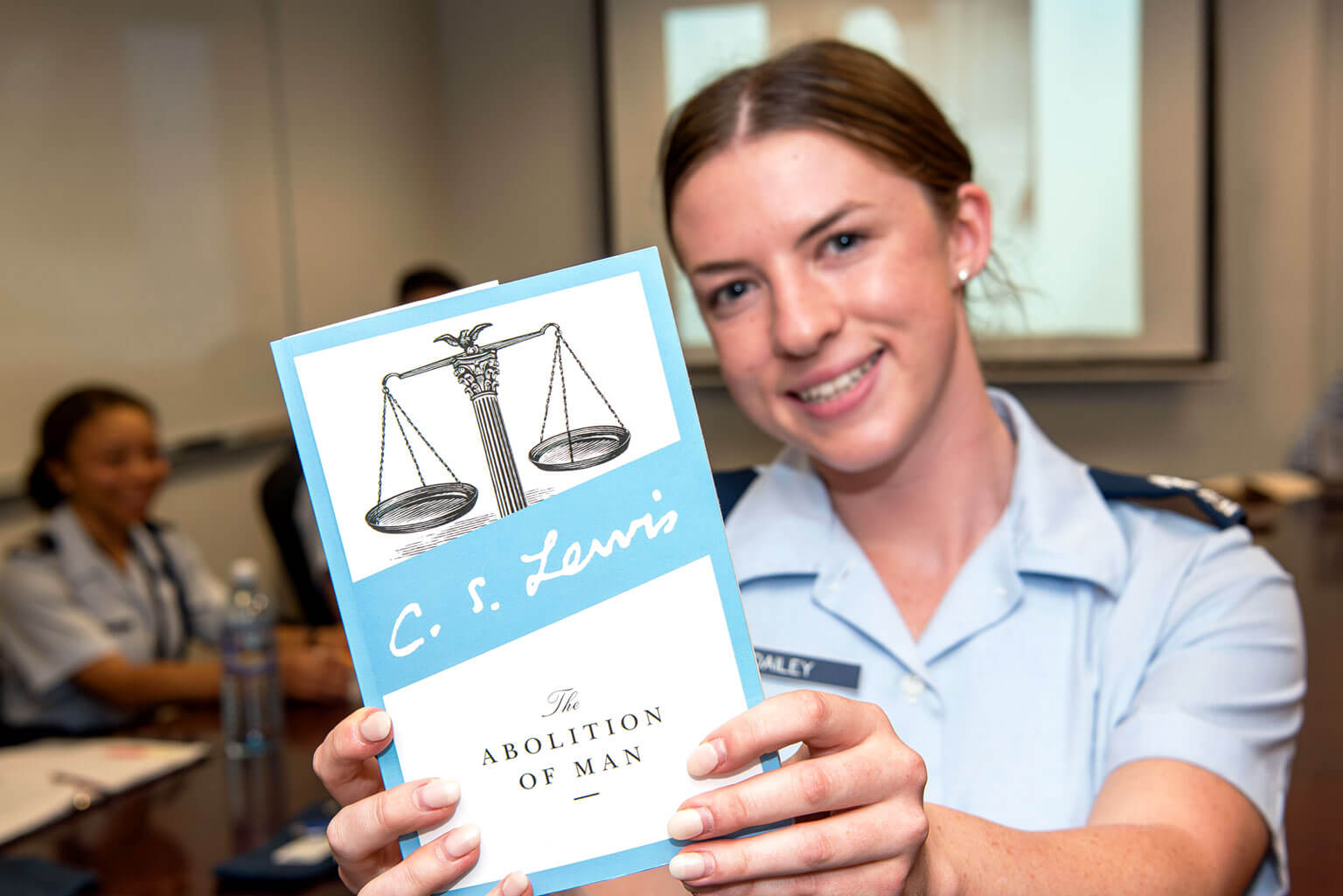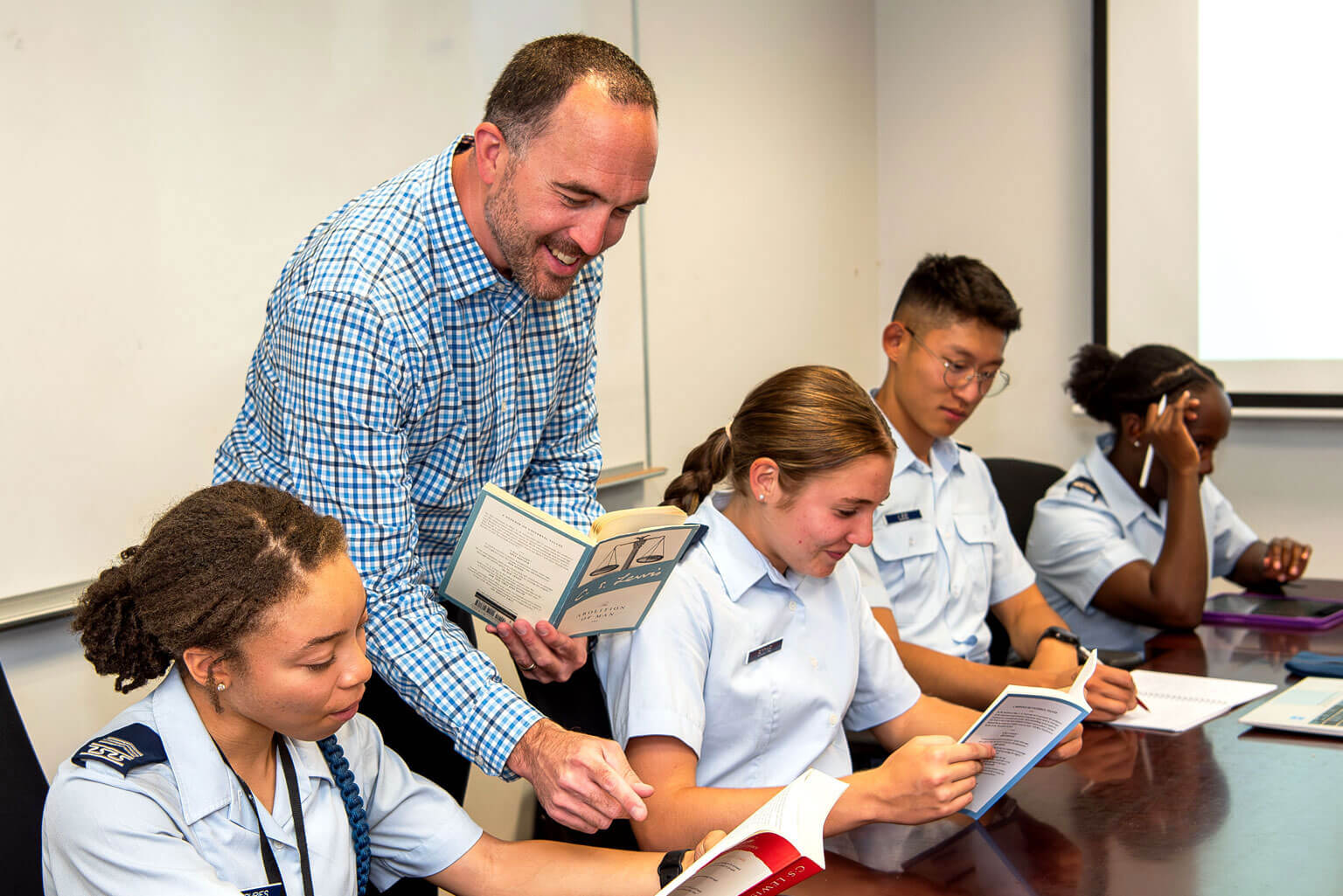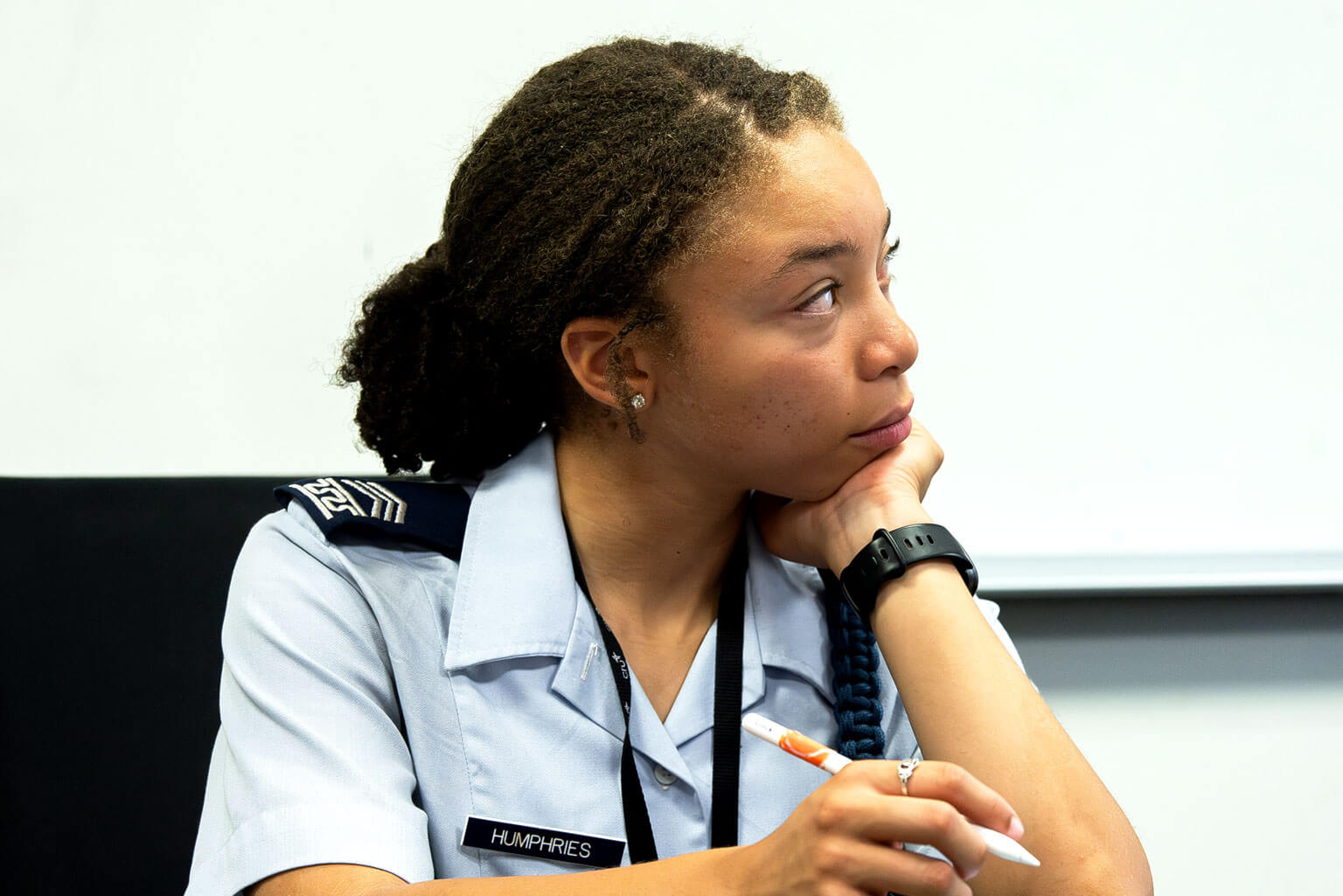Examining the works of C.S. Lewis: critical thinking and ethics

Cadet 2nd Class Grace Dailey displays a copy of C.S. Lewis’s “The Abolition of Man” Aug. 20, 2024. The book is one of many Dr. Adam Pelser uses to teach his “C.S. Lewis and Philosophy” course at the U.S. Air Force Academy. (U.S. Air Force photo by Trevor Cokley)
By Randy Roughton
U.S. Air Force Academy Strategic Communications
U.S. AIR FORCE ACADEMY, Colo. – Twentieth-century author C.S. Lewis’s books dominate the top shelf in Dr. Adam Pelser’s office. Pelser, who was recently recognized as an Inaugural Fellow of the Inklings Project, has used Lewis’ work to teach critical thinking skills and ethics in his Department of Philosophy course since 2018.
A quote in Lewis’s essay, “Learning in War-Time,” is especially impactful for Pelser. He included it in the C.S. Lewis and Philosophy curriculum: “Good philosophy must exist, if for no other reason, because bad philosophy needs to be answered.” The course contributes to the Philosophy major and minor and the Religion Studies minor. While Lewis was not a philosophy professor, Pelser considers him to be one of the most influential philosophers and theologians of the 20th century.
“C.S. Lewis is one of my favorite authors and I enjoy examining his works,” Pelser said. “But I have raised objections to his writings in my published work. I’m willing to criticize him and raise objections to some of his philosophical views. I think it’s good for our cadets to see a professor who admires an author but is also willing to criticize his work when necessary. That might be something some of them have never encountered before.”

U.S. Air Force Academy Department of Philosophy professor Dr. Adam Pelser instructs cadets in his C.S. Lewis and Philosophy course Aug. 20, 2024. Pelser uses Lewis texts to teach ethics, philosophy and critical thinking strategies. (U.S. Air Force photo by Trevor Cokley)
Reading with a critical eye
In Pelser’s course, cadets evaluate and discuss the philosophical arguments and themes in some of Lewis’s most influential non-fiction books and essays. They also observe how Lewis interacted with the philosophers and philosophies of his era, including the Oxford philosopher Elizabeth Anscombe, and the most noteworthy philosophers in history such as Aristotle, Plato, Immanuel Kant and David Hume.
Cadets read a series of Lewis books and learn to approach them with “a critical eye,” Pelser said. Like their professor, the cadets can raise their objections to Lewis’s arguments and study how the author interacted with his era’s other great thinkers.
Discussing and debating Lewis’s philosophy
Cadet 2nd Class Grace Dailey is a Philosophy major with a Religion Studies minor. She initially registered for the class because of her interest in Christian apologetics but quickly learned she also enjoyed the analyzing and discuss aspects of the course.
“After only five lessons, I am thoroughly enjoying the class,” she said. “I love delving into Lewis’s arguments and engaging in structural class discussions. The class teaches us to think critically about our own philosophical presuppositions and worldviews.”
Pelser has four goals for each course. First, he wants to deepen an understanding of the philosophical themes in Lewis’ writings. Second is a deeper understanding of the historical and contemporary philosophical influences on Lewis’s thought. The third goal is for cadets to learn to identify and summarize theses and arguments in philosophical texts. Finally, he wants each cadet to write and think through arguments carefully and clearly.
“A major critical thinking component is the dialogue in class when we push each other and challenge ideas,” Pelser said. “That is an important skill they learn in our course.”
Cadets also work on a group project where they read one of Lewis’s books not discussed in class. They then present the philosophical themes they gleaned from their reading and explain where they saw similar themes in other Lewis works.
C.S. Lewis and Philosophy is taught every other year. It will be available again during the Fall 2026 term, Pelser said.

Cadet 2nd Class Ymonie Humphries listens to Dr. Adam Pelser’s lesson during his C.S. Lewis and Philosophy course Aug. 20, 2024. The class also teaches critical thinking strategies and ethics education. (U.S. Air Force photo by Trevor Cokley)
The class’s impact on graduates
Capt. Matthew Pryor, Class of 2020, completed the course during his second-degree year at the Academy. Now the 492nd Fighter Squadron chief of intelligence at RAF Lakenheath, England, Pryor said he relied upon the concept he learned from the Department of Philosophy course in graduate school at Cambridge University and early in his U.S. Air Force career.
“I had the pleasure of taking Dr. Pelser’s C.S. Lewis and Philosophy course,” Pryor said. “‘Abolition of Man’ remains one of my favorite works, which we explored during the course. Lewis’s unique presentation of the intersection of character and critical thinking found in Abolition both molded my own thinking and proved invaluable to my success in graduate school.”
See more photos of the C.S. Lewis and Philosophy class on Flickr.